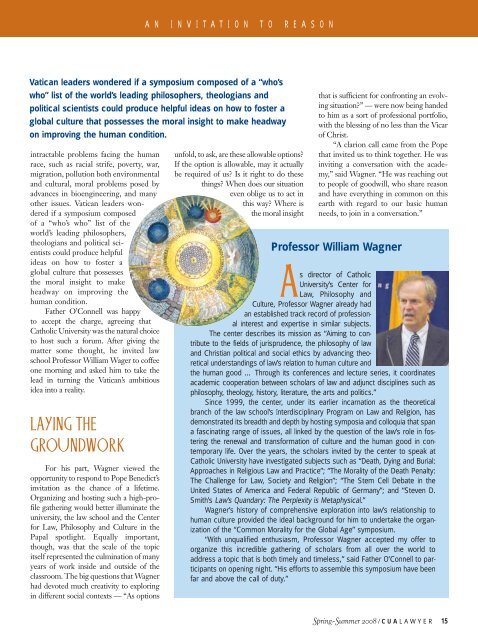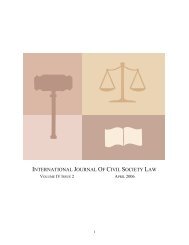Connected Minds,Connected Cultures:\ Connected Minds
Connected Minds,Connected Cultures:\ Connected Minds
Connected Minds,Connected Cultures:\ Connected Minds
- No tags were found...
Create successful ePaper yourself
Turn your PDF publications into a flip-book with our unique Google optimized e-Paper software.
A N I N V I T A T I O N T O R E A S O NVatican leaders wondered if a symposium composed of a “who’swho” list of the world’s leading philosophers, theologians andpolitical scientists could produce helpful ideas on how to foster aglobal culture that possesses the moral insight to make headwayon improving the human condition.intractable problems facing the humanrace, such as racial strife, poverty, war,migration, pollution both environmentaland cultural, moral problems posed byadvances in bioengineering, and manyother issues. Vatican leaders wonderedif a symposium composedof a “who’s who” list of theworld’s leading philosophers,theologians and political scientistscould produce helpfulideas on how to foster aglobal culture that possessesthe moral insight to makeheadway on improving thehuman condition.Father O’Connell was happyto accept the charge, agreeing thatCatholic University was the natural choiceto host such a forum. After giving thematter some thought, he invited lawschool Professor William Wager to coffeeone morning and asked him to take thelead in turning the Vatican’s ambitiousidea into a reality.LAYING THEGROUNDWORKFor his part, Wagner viewed theopportunity to respond to Pope Benedict’sinvitation as the chance of a lifetime.Organizing and hosting such a high-profilegathering would better illuminate theuniversity, the law school and the Centerfor Law, Philosophy and Culture in thePapal spotlight. Equally important,though, was that the scale of the topicitself represented the culmination of manyyears of work inside and outside of theclassroom. The big questions that Wagnerhad devoted much creativity to exploringin different social contexts — “As optionsunfold, to ask, are these allowable options?If the option is allowable, may it actuallybe required of us? Is it right to do thesethings? When does our situationeven oblige us to act inthis way? Where isthe moral insightthat is sufficient for confronting an evolvingsituation?” — were now being handedto him as a sort of professional portfolio,with the blessing of no less than the Vicarof Christ.“A clarion call came from the Popethat invited us to think together. He wasinviting a conversation with the academy,”said Wagner. “He was reaching outto people of goodwill, who share reasonand have everything in common on thisearth with regard to our basic humanneeds, to join in a conversation.”Professor William WagnerAs director of CatholicUniversity’s Center forLaw, Philosophy andCulture, Professor Wagner already hadan established track record of professionalinterest and expertise in similar subjects.The center describes its mission as “Aiming to contributeto the fields of jurisprudence, the philosophy of lawand Christian political and social ethics by advancing theoreticalunderstandings of law’s relation to human culture andthe human good … Through its conferences and lecture series, it coordinatesacademic cooperation between scholars of law and adjunct disciplines such asphilosophy, theology, history, literature, the arts and politics.”Since 1999, the center, under its earlier incarnation as the theoreticalbranch of the law school’s Interdisciplinary Program on Law and Religion, hasdemonstrated its breadth and depth by hosting symposia and colloquia that spana fascinating range of issues, all linked by the question of the law’s role in fosteringthe renewal and transformation of culture and the human good in contemporarylife. Over the years, the scholars invited by the center to speak atCatholic University have investigated subjects such as “Death, Dying and Burial:Approaches in Religious Law and Practice”; “The Morality of the Death Penalty:The Challenge for Law, Society and Religion”; “The Stem Cell Debate in theUnited States of America and Federal Republic of Germany”; and “Steven D.Smith’s Law’s Quandary: The Perplexity is Metaphysical.”Wagner’s history of comprehensive exploration into law’s relationship tohuman culture provided the ideal background for him to undertake the organizationof the “Common Morality for the Global Age” symposium.“With unqualified enthusiasm, Professor Wagner accepted my offer toorganize this incredible gathering of scholars from all over the world toaddress a topic that is both timely and timeless,” said Father O’Connell to participantson opening night. “His efforts to assemble this symposium have beenfar and above the call of duty.”Spring–Summer 2008 / C UALAWYER 15
















